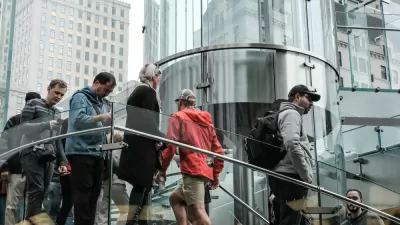The short answer to the question about whether someone needs professional or activist planning experience before graduate school is yes!
The short answer to the question about whether someone needs professional or activist planning experience before graduate school is yes! You will have a clearer sense of the important questions you have about planning and your peers will have more to learn from your experiences. For this reason admissions committees favor students who have some employment and/or activist history. (With a few years of work experience you'll also likely have more money, which is handy in terms of paying for things like heat).
The current job market can seem very frightening to undergraduates, of course. But graduate school is not a refuge. Graduate school applications were way up last year and are likely to be that way again. Those who have not yet graduated will find it very difficult to gain admission, let alone substantial funding. Committees looking for ways to narrow the field will often put all those in the not-yet-graduated group straight in the "B," "C," or "D" pile of applications. In this blog I describe how to navigate the current internship and job markets so current undergraduates can gain enough experience to make it into the applicant "A" list for your preferred graduate school offering reasonable funding, in a few years.
First it needs to be said that this is not the first time that job markets have been tight. There are periodic recessions that limit options-I was an undergraduate in the downturn of the early 1980s for example and entered academic life in the early-to-mid-1990s when there was little hiring. Experiences of many planners in those numerous earlier downturns show it is possible to make enough money to support oneself and prepare for a career in planning. The path, however, may be a little different when compared with the easy job market of recent years.
Getting a Job vs. Getting into Graduate School: Employers of beginning planners-to-be and graduate schools look for slightly different things as I have noted in earlier blogs.
- Surveys of employers and graduate planners show they want skills in communication, political savvy, teamwork, and analysis. However, as I said in an earlier blog about first jobs for planners, employers also "want to know if you will turn up at work on time, focus your attention on what you are being paid to do, show flexibility in what you are willing to take on, demonstrate good judgment about how you spend your day, get on with co-workers, share credit, learn from mistakes, and be basically honest."
- Graduate planning programs are a little less concerned with office skills and a bit more with ideas about planning. They want to know about your experience in planning seen broadly (in the work place, as an activist, or as a volunteer), how it leads you to want to go to graduate school, what issues you find most compelling, and why you are interested in that particular program.
Coursework, Internships, Employment, then Grad School: So for undergraduates, doing planning related coursework while a student, doing some planning related volunteering, and subsequently holding down a job involving some teamwork are all good preparation for going to graduate school.
- If a job in planning is not to be found then get one in some related area and volunteer.
- If you can only find a fairly routine job doing paperwork in a planning office or firm, make the best of it. Few jobs are perfect and learning to see the bright side of things is important--even if the bright side is the insight that you'd like to work in a different type of planning job in the long-term.
The Internship Edge: Internships while still an undergraduate can help build skills so you can have a better chance of getting into graduate school after two years of work experience rather than four.
- Look early. In a typical year start researching places and sending out resumes in January. This year with all the uncertainty one may well be able to send them out later as people won't know until March or April how much money they have.
- To find places, use your career services office and alumni networks. Also, read. Read professional magazines to find out who is doing interesting work; read web sites; read journals. The reading will pay off when you get an interview and it will help you find places that interest you.
- Remember, even if you are not being paid very much, the time to supervise you is quite costly for the organization. I actually steer clear of unpaid interns because they often expect higher powered work than their skill set allows. So try to make your (prospective) employer see you as a net positive.
- Use faculty for advice but don't expect people to give you addresses of contacts. With a few exceptions I now require students to have done at least one class with me before I open up my address book, even for internships.
- And as I said in a previous blog you may be just as well off in a (paid) factory or office position as long as it allows you time to do volunteer planning work. Through the job you can demonstrate teamwork and initiative and show you can support yourself while the volunteer work can show your commitment to the field. But if you take this route do informational interviews so you can also understand the planning job market--in whatever kind of planning that interests you.
In Summary: Do good courses, do internships, graduate and hold down a job that is planning related or lets you volunteer in planning. Then in a few years you can get a great place in a planning masters program.

Alabama: Trump Terminates Settlements for Black Communities Harmed By Raw Sewage
Trump deemed the landmark civil rights agreement “illegal DEI and environmental justice policy.”

Planetizen Federal Action Tracker
A weekly monitor of how Trump’s orders and actions are impacting planners and planning in America.

Why Should We Subsidize Public Transportation?
Many public transit agencies face financial stress due to rising costs, declining fare revenue, and declining subsidies. Transit advocates must provide a strong business case for increasing public transit funding.

Understanding Road Diets
An explainer from Momentum highlights the advantages of reducing vehicle lanes in favor of more bike, transit, and pedestrian infrastructure.

New California Law Regulates Warehouse Pollution
A new law tightens building and emissions regulations for large distribution warehouses to mitigate air pollution and traffic in surrounding communities.

Phoenix Announces Opening Date for Light Rail Extension
The South Central extension will connect South Phoenix to downtown and other major hubs starting on June 7.
Urban Design for Planners 1: Software Tools
This six-course series explores essential urban design concepts using open source software and equips planners with the tools they need to participate fully in the urban design process.
Planning for Universal Design
Learn the tools for implementing Universal Design in planning regulations.
Caltrans
Smith Gee Studio
Institute for Housing and Urban Development Studies (IHS)
City of Grandview
Harvard GSD Executive Education
Toledo-Lucas County Plan Commissions
Salt Lake City
NYU Wagner Graduate School of Public Service






























